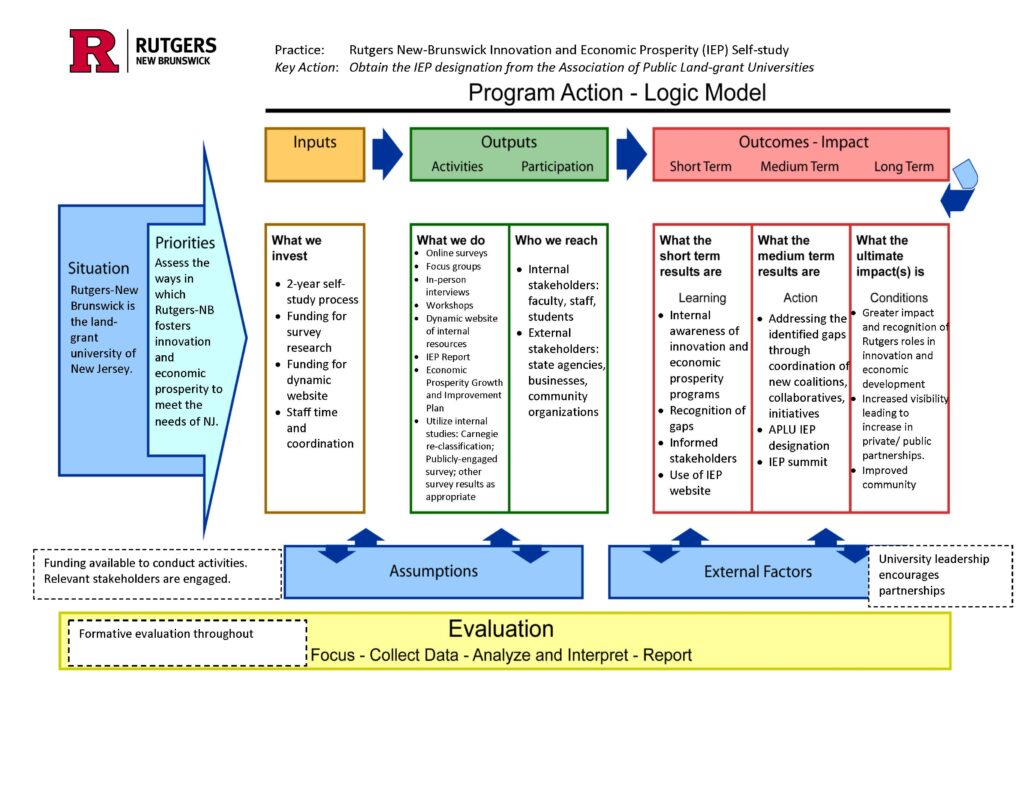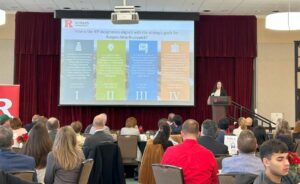Self-study
Rutgers-New Brunswick conducted a self-study on its innovation and economic prosperity initiatives as part of obtaining the Innovation and Economic Prosperity (IEP) designation from the Association of Public Land Grant-universities (APLU) from 2022 to 2024. The process for achieving this designation helped the University have a better understanding of how it maximizes knowledge generation, the innovation ecosystem that supports it, and the economic impacts it generates. It also helped identify where improvements can be made to facilitate these efforts and to increase the benefits of the university to broader society.
Logic Model
For the IEP designation process, the following logic model was used to illustrate that by conducting the self-study, the University will have an internal awareness of innovation and economic prosperity programs as well as the recognition of areas of growth and improvement. Ultimately, the self-study aims to result in increased visibility, partnerships, and improved community.
Academic Master Plan
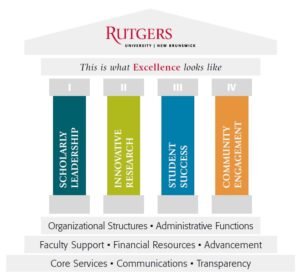 The Academic Master Plan for Rutgers-New Brunswick is based on the pursuit of excellence, with the four pillars of excellence standing upon a foundation of resources. As part of the IEP self-study, an evaluation of how the University supports innovation and economic prosperity across the four pillars and the foundation of resources was conducted.
The Academic Master Plan for Rutgers-New Brunswick is based on the pursuit of excellence, with the four pillars of excellence standing upon a foundation of resources. As part of the IEP self-study, an evaluation of how the University supports innovation and economic prosperity across the four pillars and the foundation of resources was conducted.
Diversity Strategic Plan 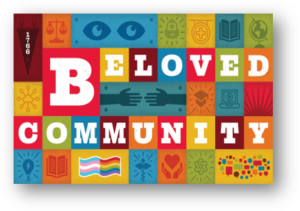
As part of the IEP self-study, an assessment of how Rutgers-New Brunswick achieves the goals of the Diversity Strategic Plan while conducting activities that foster innovation and economic prosperity was conducted. Questions were asked to better understand how diverse communities are developed and how inclusive scholarship and teaching are fostered. Where there is community engagement, the measures that are taken to ensure that the engagement is sustainable and substantive were documented.
Stakeholder Involvement
The IEP designation process required the involvement of many faculty, staff, students, and administrators to capture the efforts across the campus. External stakeholders provided input as well.
The self-study was led by the IEP core team along with the representatives from the Chancellor-led units who served as the points of contact and were instrumental in selecting and recruiting stakeholders to participate in the self-study. Also, Brian Kurisky, Executive Director of the Rutgers Collaborative for Community Engagement at DICE, shared related information from the Rutgers-New Brunswick Carnegie Reclassification effort that is underway. The Bloustein Center for Survey Research assisted with the collection of information by conducting one-on-one interviews and facilitated discussions on behalf on the IEP self-study team.
As a result, a total of 217 internal and external stakeholders provided input: 96 one-on-one interviews of faculty and staff; 34 online surveys; and 87 participated in facilitated discussions during the Innovation and Economic Prosperity (IEP) World Café event.
The IEP World Café was held on November 8, 2023 to further engage internal and external stakeholders in a meaningful group discussion activity. At this half-day event utilizing a “world café” model for larger group dialogue, internal stakeholders (faculty, staff, and students) discussed topics centered around the Rutgers-New Brunswick Academic Master Plan: scholarly leadership; innovative research; student success; community engagement; and support services. At the same time, external stakeholders (industry, nonprofit, and governmental attendees) had discussions regarding diversity, inclusion, and community engagement; research; outreach and service; collaboration; talent development; funding; and communications. The facilitated discussions that occurred at the IEP World Café were then synthesized, and the recommendations were incorporated into the IEP application.
As part of the self-study, internal and external stakeholders were asked questions about their work at or with Rutgers-New Brunswick and how it incorporates APLU’s IEP framework of talent, innovation, place, and economic prosperity, as defined below.
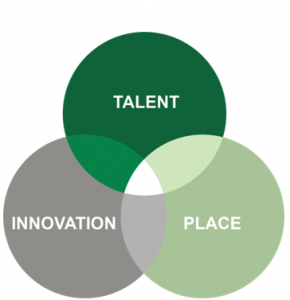
- Talent – education and workforce development that help prepare students (traditional and non-traditional) for jobs, careers, and a lifetime of success.
- Innovation – research, service and outreach programs that support innovation, technology-based economic development, and entrepreneurship, which fuel the innovation economy.
- Place – public service, outreach and extension, and community engagement that contribute to social, cultural, or community development and the stewardship of place.
- Economic prosperity is measured as impact with emphasis on how the outputs of University-produced knowledge and innovation improve the human condition either through direct intervention or indirectly through changes in government or business policies and practices. Examples of specific impacts could include: industry-research partnerships, technology transfer, technical assistance to businesses, entrepreneurial development, industry training and education, jobs created, new businesses created, sustainable and resilient businesses, communities, and environments.
APLU IEP Designation
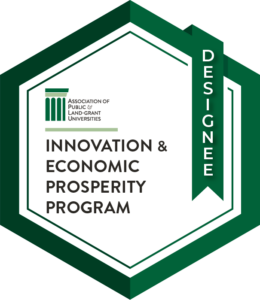
The IEP designation application for Rutgers-New Brunswick was submitted to the APLU in May 2024, and in July 2024, Rutgers-New Brunswick was awarded the IEP designation from the APLU for demonstrating outstanding programs that enable the university to maximize the economic and community engagement impact of the institution, as well as a strong plan for growth and improvement to further build these capabilities. Rutgers-New Brunswick joins the ranks of over 85 public higher education institutions holding this designation.
To build upon the efforts of the self-study, a Growth and Improvement Plan is underway. By pursuing the recommendations in the Growth and Improvement Plan, there is tremendous opportunity for Rutgers-New Brunswick to establish itself as a national model for effective leadership, organization and communication of economic and community-engaged efforts.
